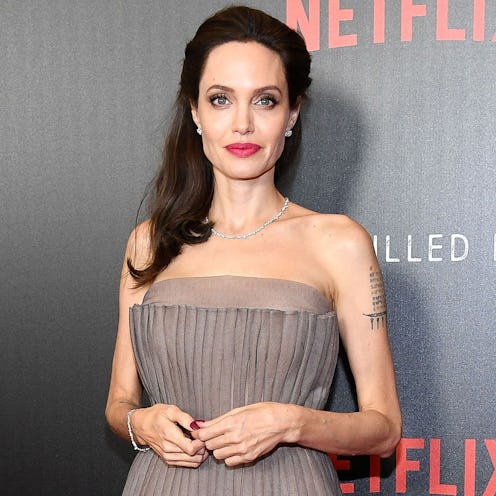Rarely does a celebrity as altruistic as Angelina Jolie come along. The actress and filmmaker has long spoken out against societal injustices including gender inequality and the plight of refugees, but it's her activism that makes her a standout citizen. She's become a special envoy to the United Nations, generously donated to struggling communities through the Jolie-Pitt Foundation and told poignant stories that bring attention to the suffering of millions of women and girls around the world.
Her latest producing project, The Breadwinner, is no different; the plot centers on an 11-year-old Afghan girl named Parvana who disguises herself as a boy to help feed her family in Taliban-controlled Afghanistan. And as part of Harper's Bazaar's 150th anniversary, Angie fronts the mag's November issue to advance the message of her new film: that all of us have a responsibility to others and that the things we do right now undeniably have a rippling effect on future civilizations.
"My mother, who was part Iroquois Indian on her father's side, taught me the Iroquois saying that we should consider the impact of our decisions upon the next seven generations," she shares. "It is hard for us to be that thoughtful, with all the pressures in our lives, but it seems to me to be a beautiful aspiration."
From technology and science to establishing our right to vote, our country has clearly seen great advancements, but many remain underdeveloped, particularly the understanding of environmental issues. To Angelina, who wrote a letter to the magazine from a nature reserve in Namibia, our surroundings are what enable us to grow—think nature leading to nurture—and when that is compromised, it only deepens the poverty felt by the world's poor. "For me, Namibia represents not only ties of family and friendship, but also the effort to find the balance between humans and the environment so crucial to our future," she writes.
Angelina also relays the importance of women's rights through education and health, two of the sectors she says are the first to suffer in a damaged environment. This is why she continues to advocate against buying illegal wildlife products like ivory and rhino horn—and she's urging the fashion industry to follow suit.
"What we do, each in our own small way, matters," she explains. "The hopeful thought is that it is in our hands. Over the next 150 years, technology is going to give us more and better means of communicating, fighting poverty, defending human rights and caring for the environment. But it is what we choose to do with the freedom we have that will make all the difference."
Read the rest of Angelina's essay here.
